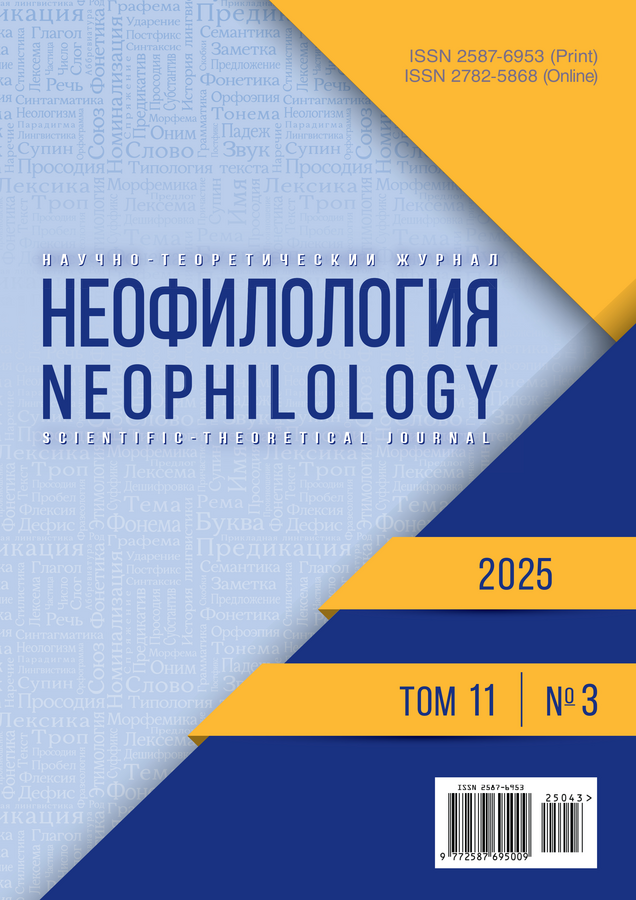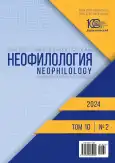Семантический потенциал рассказа Л. Андреева «Кусака»
- Авторы: Кузьминых Е.О.1, Скуридина С.А.1, Бугакова Н.Б.1
-
Учреждения:
- ФГБОУ ВО «Воронежский государственный технический университет»
- Выпуск: Том 10, № 2 (2024)
- Страницы: 294-303
- Раздел: РУССКИЙ ЯЗЫК. ЯЗЫКИ НАРОДОВ РОССИИ
- URL: https://journal-vniispk.ru/2587-6953/article/view/295592
- DOI: https://doi.org/10.20310/2587-6953-2024-10-2-294-303
- ID: 295592
Цитировать
Полный текст
Аннотация
ВВЕДЕНИЕ. Исследование будет полезно не только лингвистам и литературоведам, но и учителям литературы, поскольку произведения Л. Андреева входят в школьную программу. Целью является выявление семантического потенциала рассказа Л. Андреева «Кусака». Актуальность исследования обусловлена необходимостью изучения для современной филологической науки художественных текстов Л. Андреева с точки зрения выявления способности единиц разного уровня, находящихся во взаимосвязи, выступать маркерами мифопоэтического кода.МАТЕРИАЛЫ И МЕТОДЫ. Текст рассказа Л. Андреева «Кусака» представляет собой систему разноуровневых единиц, анализ которых способствует более глубокому проникновению в художественный замысел автора. Использованы как общенаучные, так и специальные лингвистические методы: метод лингвистического наблюдения и описания, этимологический, словообразовательный, ономастический, контекстуальный, стилистический и лингвокультурный виды анализа.РЕЗУЛЬТАТЫ ИССЛЕДОВАНИЯ. Показано, что для художественного текста Л. Андреева характерна взаимосвязь единиц разного уровня, выявляющих мифопоэтическую основу рассказа, представленную оппозициями свой– чужой, свет–тьма, звук–тишина. Доминантами рассказа являются лексемы дом, двор, сад, солнце, мрак. Диминутивы, используемые автором при описании девушки и собаки, создают образ игрушки, которая интересна и желанна в настоящем, но может быть вследствие потери к ней интереса оставлена в будущем. Особую смысловую нагрузку имеют имена собственные (зоонимы Жучка, Кусака, Кусачка и антропонимы Лёля, Илюша, Догаевы) и их отсутствие.ЗАКЛЮЧЕНИЕ. Как и в большинстве произведений Л. Андреева, в рассказе «Кусака», демонстрирующем борьбу света с мраком, представлен путь обретения (Кусака) и потери души (Лёля и другие люди, которых почему-то называют добрыми). Всё это происходит на фоне природной цикличности – зима–весна–лето–осень–… коррелируют с природными процессами рождения–развития–старости–смерти. Наступившая после отъезда людей, бросивших Кусаку, превратившуюся снова просто в безымянную собаку, беспросветно-тёмная ночь становится символом потерянной надежды, потерянного счастья.
Ключевые слова
Об авторах
Е. О. Кузьминых
ФГБОУ ВО «Воронежский государственный технический университет»
Email: eleshka-82@yandex.ru
ORCID iD: 0000-0002-7571-7634
кандидат филологических наук, доцент кафедры русского языка и межкультурной коммуникации
394006, Российская Федерация, г. Воронеж, ул. 20-летия Октября, 84С. А. Скуридина
ФГБОУ ВО «Воронежский государственный технический университет»
Email: saskuridina@yandex.ru
ORCID iD: 0000-0002-2313-2482
доктор филологических наук, доцент, заведующий кафедрой русского языка и межкультурной коммуникации
394006, Российская Федерация, г. Воронеж, ул. 20-летия Октября, 84Н. Б. Бугакова
ФГБОУ ВО «Воронежский государственный технический университет»
Автор, ответственный за переписку.
Email: ya_witch@mail.ru
ORCID iD: 0000-0002-2683-0665
кандидат филологических наук, доцент, доцент кафедры русского языка и межкультурной коммуникации
394006, Российская Федерация, г. Воронеж, ул. 20-летия Октября, 84Список литературы
- Ячина Н.П., Давлатова М.М. Язык писателя и стилистика художественной речи как средства воспитания (на материале текстов художественных произведений Леонида Андреева) // Казанская наука. 2023. № 10. С. 206-208. https://elibrary.ru/cnuaei
- Борисова В.В., Котовская Д.О. Библейские образы и мотивы в произведениях Ф.М. Достоевского и Л.Н. Андреева // Культура и текст. 2023. № 3 (54). С. 33-40. https://doi.org/10.37386/2305-4077-2023-333-40, https://elibrary.ru/djhisb
- Гусева Т.К. Гармония и хаос: концепция экзистенциального человека Леонида Андреева // Вестник Московского государственного гуманитарного университета им. М.А. Шолохова. Филологические науки. 2012. № 2. С. 14-26. https://elibrary.ru/pavbqv
- Скуридина С.А., Кузьминых Е.О., Новикова М.В. Бинарные оппозиции в рождественском рассказе Л. Андреева «Ангелочек» // Проблемы исторической поэтики . 2023. Т. 21. № 3. С. 124-144. https://doi.org/10.15393/j9.art.2023.12722, https://elibrary.ru/pqexzu
- Михеичева Е.А. Мотив воскрешения в творчестве Леонида Андреева // Проблемы исторической поэтики. 2017. Т. 15. № 1. С. 68-79. https://doi.org/10.15393/j9.art.2017.4201, https://elibrary.ru/xygssp
- Ширванова Э.Н., Гаджиева Р.М. Индивидуалистические мотивы в творчестве Леонида Андреева (мотивы пессимизма, одиночества и бунта) // Вестник Дагестанского государственного университета. Серия 2. Гуманитарные науки. 2019. Т. 34. № 4. С. 19-24. https://doi.org/10.21779/2542-0313-201934-4-19-24, https://elibrary.ru/odxzmt
- Ширванова Э.Н., Гаджиева Р.М. Образ Иуды Искариота в контексте канонического и апокрифического Евангелия в одноимённой повести Леонида Андреева // Вестник Дагестанского государственного университета. Серия 2: Гуманитарные науки. 2018. Т. 33. № 4. С. 50-58. https://doi.org/10.21779/2542-0313-2018-33-4-50-58, https://elibrary.ru/lqysog
- Самойловский А.Л. Образ Иуды Искариота по каноническим и апокрифическим источникам // Наука. Общество. Оборона. 2020. Т. 8. № 3. Ст. 33. https://doi.org/10.24411/2311-1763-2020-10249, https://elibrary.ru/wbumpw
- Подгорская А.В. Художественная «реконструкция» библейского образа Иуды в литературе XX века (Л. Андреев «Иуда Искариот» и М. Булгаков «Мастер и Маргарита») // Гуманитарно-педагогические исследования. 2021. Т. 5. № 2. С. 46-49. https://doi.org/10.18503/2658-3186-2021-5-2-45-48, https://elibrary.ru/brwxut
- Хайрулина О.И., Монисова И.В. Драматургия Леонида Андреева в контексте европейского литерату рного процесса: анализ отечественных исследований // Вестник Пермского университета. Российская и зарубежная филология. 2019. Т. 11. № 1. С. 140-147. https://doi.org/10.17072/2037-6681-2019-1-140147, https://elibrary.ru/gvqpcm
- Титаренко С.Д. Творчество Леонида Андреева в зеркале символистской антропологи и и философии искусства // Вестник Санкт-Петербургского университета. Язык и литература. 2018. Т. 15. № 1. С. 136-146. https://doi.org/10.21638/11701/spbu09.2018.111, https://elibrary.ru/xrzfrz
- Ильин В.В. К юбилею писателя: философские уроки Леонида Андреева // Российский гуманитарный журнал. 2021. Т. 10. № 2. С. 69-84. https://doi.org/10.15643/libartrus-2021.2.1, https://elibrary.ru/ktyyhl
- Исенова А.К. Рассказы Л.Н. Андреева «Бергамот и Гараська» и «Кусака» в школьном изучении // Молодой учёный. 2014. № 9 (68). С. 534-536. https://elibrary.ru/sfnxcx
- Свирида И.И. Время сада // Знаки времени в славянской культуре: от барокко до авангарда: сб. ст. М.: Ин-т славяноведения РАН, 2009. С. 181-194. https://elibrary.ru/odppbb
Дополнительные файлы











